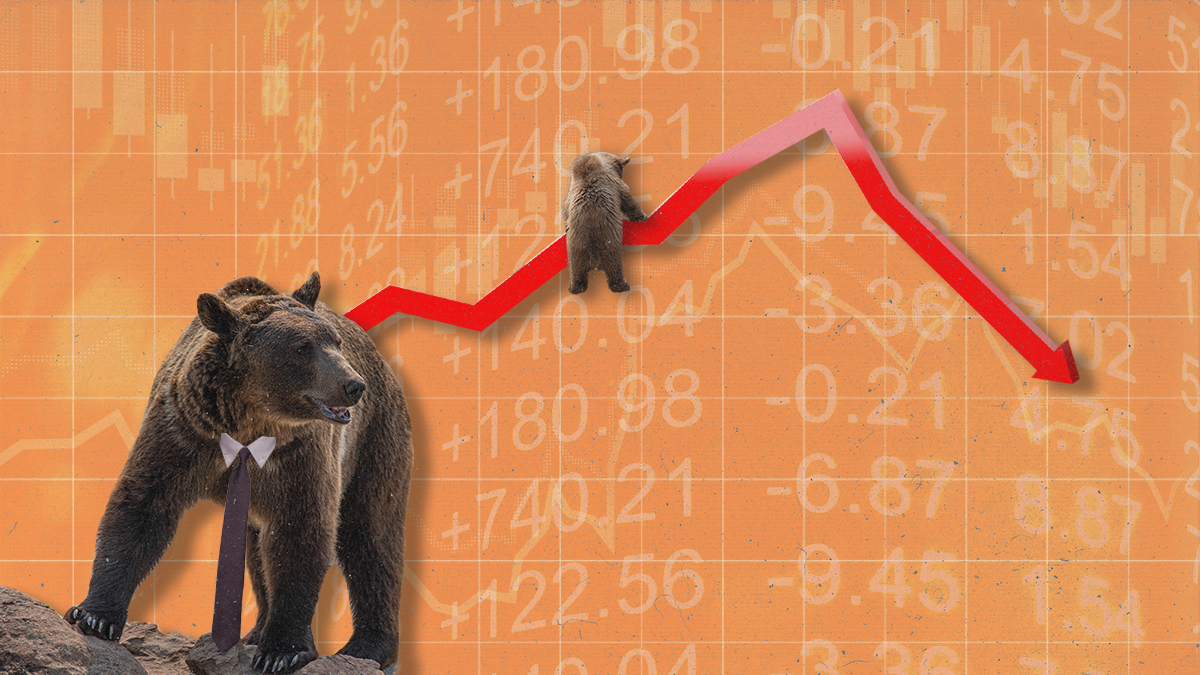June 24, 2022
If you're an American worker with a 401(k), you're probably worried about being in the claws of a certain furry animal everyone seems to be talking about these days.
We're referring to a bear market, a Wall Street term for when the value of stock indices like the Dow Jones Industrial or the S&P 500 fall under 20% or more from a recent peak for a sustained period of time. Since bears hibernate, it’s investor-speak for a market in retreat.
On June 13, the S&P 500 officially entered bear market territory — with big implications for both investors and people who are indirect participants in the stock market through their 401(k), America's most popular company-sponsored retirement account. Simply put, since your 401(k) is likely invested in stocks, the longer the current slump lasts, the less money you'll have for retirement.
But that's only true if the bear market is still ongoing when you retire.
In other words, if you can afford to wait it out, odds are that the bear will eventually be followed by a bull (market) — aka a cycle of expansion — once the current economic turmoil subsides. Still, you might have a problem if you're a baby boomer with only a few years left to reach retirement age, in which case you'll have to crunch the numbers to decide whether it's best to cash out now — with less money, and pay taxes on what you withdraw — or pin your hopes on a swift recovery.
The thing is, no one knows how long bear markets last. The average historical duration is about a year, but in the early 1970s the bear stayed in its cave for almost two years, the S&P 500 lost half its value, and the US economy took a whopping 69 months to completely recover.
During the 2007-2008 Great Recession, the S&P 500 decline was even sharper (57%) and the market only recovered after 49 months.
Will the bear be followed by an even scarier recession? Maybe, but it's not guaranteed.
One key difference between the current US bear market and previous ones that preceded recessions is that unemployment is still very low at 3.6%. When Americans start losing their jobs at a higher rate, though, that's likely a sign that a recession is on the way.
What’s more, with the Fed getting tough on interest rates to tame sky-high inflation, it’s certainly possible that the US economy won’t hit the Goldilocks “soft landing” of bringing inflation down to about 2% while avoiding a recession (two consecutive quarters of negative GDP growth).
Regardless, “making any prediction is unusually fraught” now due to an unprecedented set of shocks, including COVID and the war in Ukraine, says Robert Kahn, Eurasia Group's director of Global Macro-Geoeconomics.
Still, he adds, a recession seems more likely than not. It'll be painful, but not necessarily a catastrophe.
“Recessions can be moderate in tone,” Kahn explains. And whether or not we get one, “we’re going to have tremendous uncertainty heading into this slowdown period about how that plays out.”
From Your Site Articles
More For You
Bad Bunny during the Super Bowl LX halftime show press conference at Moscone Center.
Kirby Lee-Imagn Images
100 million: The number of people expected to watch the Super Bowl halftime performance with Bad Bunny, the Puerto Rican superstar and newly minted Album of the Year winner at the Grammys.
Most Popular
Think you know what's going on around the world? Here's your chance to prove it.
- YouTube
An imminent US airstrike on iran is not only possible, it's probable.
Americans are moving less — and renting more. Cooling migration and rising vacancy rates, especially across the Sunbelt, have flattened rent growth and given renters new leverage. For many lower-income households, that relief is beginning to show up in discretionary spending. Explore what's changing in US housing by subscribing to Bank of America Institute.
© 2025 GZERO Media. All Rights Reserved | A Eurasia Group media company.
